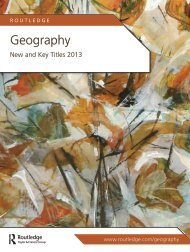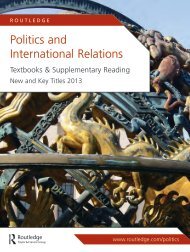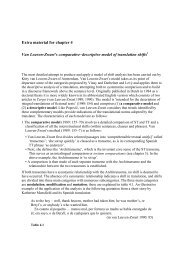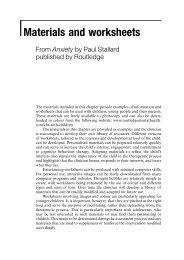Politics and International Relations 2011 (UK) - Routledge
Politics and International Relations 2011 (UK) - Routledge
Politics and International Relations 2011 (UK) - Routledge
Create successful ePaper yourself
Turn your PDF publications into a flip-book with our unique Google optimized e-Paper software.
54<br />
iNterNAtioNAl security<br />
Territory, War, <strong>and</strong> Peace<br />
John A. Vasquez <strong>and</strong> Marie T. Henehan,<br />
both at University of Illinois at Urbana-Champaign,<br />
USA<br />
Series: Contemporary Security Studies<br />
This book presents a collection<br />
of new <strong>and</strong> updated essays on<br />
what has come to be known as<br />
the territorial explanation of<br />
war.<br />
The book argues that a key<br />
both to peace <strong>and</strong> to war lies in<br />
underst<strong>and</strong>ing the role territory<br />
plays as a source of conflict <strong>and</strong><br />
inter-group violence. Of all the<br />
issues that spark conflict,<br />
territorial disputes have the<br />
highest probability of escalating<br />
to war. War, however, is hardly inevitable; much depends<br />
on how territorial issues are h<strong>and</strong>led. More importantly,<br />
settling territorial disputes <strong>and</strong> establishing mutually<br />
recognized boundaries can produce long periods of<br />
peace between neighbors, even if other salient issues<br />
arise. While territory is not the only cause of war <strong>and</strong><br />
wars arise from other issues, territory is one of the main<br />
causes of war, <strong>and</strong> learning how to manage it, can, in<br />
principle, eliminate an entire class of wars.<br />
This book will be of great interest to all students of war<br />
<strong>and</strong> conflict studies, causes of war <strong>and</strong> peace,<br />
international security <strong>and</strong> strategic studies.<br />
Selected Contents: Part 1: Theory 1. Why Do Neighbors<br />
Fight? Proximity, Interactions, or Territoriality John A. Vasquez<br />
2. Distinguishing Rivals That Go To War from Those That Do<br />
Not: A Quantitative Comparative Case Study of the Two<br />
Paths to War John A. Vasquez Part 2: Territory <strong>and</strong> War<br />
3. Territorial Disputes <strong>and</strong> the Probability of War, 1816-1992<br />
John A. Vasquez <strong>and</strong> Marie T. Henehan 4. Mapping the<br />
Probability of War: The Role of Territorial Disputes Compared<br />
to the Role of Contiguity John A. Vasquez 5. The Effect of<br />
Territory on Dispute Escalation among Initiators Marie T.<br />
Henehan 6. The Probability of War, 1816-1992 John A.<br />
Vasquez Part 3: Identifying Paths to War 7. Territorial<br />
Paths to War: Their Probability of Escalation, 1816-2001 John<br />
A. Vasquez 8. Paths to War: The Territorial Origins of War<br />
John A. Vasquez Part 4: Territory <strong>and</strong> Peace 9. The<br />
Changing Probability of Interstate War, 1816-1992 Marie T.<br />
Henehan <strong>and</strong> John A. Vasquez 10. Peace, Globalization, <strong>and</strong><br />
Territoriality John A. Vasquez <strong>and</strong> Marie T. Henehan<br />
Part 5: Conclusion 11. The Significance of Territory John A.<br />
Vasquez<br />
July 2010: 234 x 156: 272pp<br />
Hb: 978-0-415-42413-4: £100.00<br />
Pb: 978-0-415-42414-1: £24.99<br />
For more information, visit:<br />
www.routledge.com/9780415424141<br />
The <strong>International</strong> <strong>Politics</strong><br />
of Mass Atrocities<br />
The Case of Darfur<br />
Edited by david R. Black, Dalhousie University,<br />
Canada <strong>and</strong> Paul d. Williams, George Washington<br />
University, USA<br />
Series: Security <strong>and</strong> Governance<br />
’This collection of essays<br />
provide an elegant reminder<br />
of why international society<br />
is a contested concept <strong>and</strong><br />
darfur is a contested conflict.<br />
A first-rate piece of work<br />
about the central dilemmas<br />
facing governments,<br />
international organizations,<br />
NGOs, <strong>and</strong> citizens.’ - Thomas<br />
G. Weiss, CUNY Graduate<br />
Center, USA<br />
’For me, this important book<br />
teaches us, through the evidence provided by<br />
regional specialists on darfur from a variety of<br />
countries, that there is less to the notions of<br />
’international society’, ’international community’,<br />
’good international citizenship’, ’solidarism’, <strong>and</strong><br />
’responsibility to protect’ than their official <strong>and</strong><br />
academic proponents claim. Tragically, such a<br />
verdict is always likely to be starkest when ’mass<br />
atrocities’ occur in Africa.’ - Ken Booth FBA,<br />
Aberystwyth University, <strong>UK</strong><br />
Selected Contents: Introduction: <strong>International</strong> Society <strong>and</strong><br />
the Crisis in Darfur Paul D. Williams <strong>and</strong> David R. Black<br />
Part 1: Regional <strong>Politics</strong> 1. The Government of Sudan <strong>and</strong><br />
the Darfurian Armed Groups I.D.F. <strong>and</strong> Munzoul Assal<br />
2. Regional <strong>Politics</strong> <strong>and</strong> the Darfur Crisis Lee J.M. Seymour<br />
Part 2: Multilateral <strong>Politics</strong> 3. The United Nations Security<br />
Council Michael MacKinnon 4. The African Union Cristina<br />
Badescu <strong>and</strong> Linnea Bergholm 5. The European Union Rory<br />
Keene <strong>and</strong> Asbjorn Wee 6. The <strong>International</strong> Criminal Court<br />
William A. Schabas Part 3: Bilateral <strong>Politics</strong> 7. The United<br />
States Scott Stedjan <strong>and</strong> Colin Thomas-Jensen 8. The<br />
People’s Republic of China Ian Taylor 9. The United Kingdom<br />
Paul D. Williams 10. France Bruno Charbonneau<br />
11. Canada David R. Black. Conclusion David R. Black <strong>and</strong><br />
Paul D. Williams<br />
January 2010: 234 x 156: 288pp<br />
Hb: 978-0-415-55902-7: £90.00<br />
Pb: 978-0-415-55903-4: £26.99<br />
eBook: 978-0-203-86217-9<br />
For more information, visit:<br />
www.routledge.com/9780415559034<br />
Full table of Contents<br />
For full table of contents on all titles<br />
featured in this catalog, visit:<br />
www.routledge.com/politics<br />
ForthcomiNg<br />
Why did the uS Invade<br />
Iraq?<br />
Edited by Jane K. Cramer, University of Oregon,<br />
USA <strong>and</strong> A. Trevor Thrall, University of Michigan,<br />
Dearborn, USA<br />
Series: <strong>Routledge</strong> Global Security Studies<br />
This volume presents the best scholarly thinking about<br />
why the U.S. invaded Iraq in 2003, a pivotal event in<br />
modern US foreign policy <strong>and</strong> international politics.<br />
The years since the announcement of the invasion of<br />
Iraq by George W. Bush in 2003 have revealed that the<br />
WMD threat was not the urgent threat the<br />
administration declared <strong>and</strong> that Saddam Hussein was<br />
not involved with Al Qaeda or 9/11. At least in part<br />
because of these revelations a majority of Americans<br />
(not to mention a majority of people globally) now<br />
believe that invading Iraq was a mistake <strong>and</strong> that the<br />
Bush administration misled the public to build support<br />
for war. Lending credibility to public doubts is a growing<br />
number of critical scholarly analyses <strong>and</strong> in-depth<br />
journalistic investigations about the invasion, which<br />
mostly suggests that the administration was not fully<br />
c<strong>and</strong>id about its reasons for wanting to move against<br />
Iraq when it did.<br />
Thus the question remains: Why did the United States<br />
invade Iraq? The central purpose of this volume is to<br />
spur <strong>and</strong> inform the debate by organizing the best<br />
recent thinking by foreign policy <strong>and</strong> international<br />
relations experts about why the U.S. invaded Iraq. Taking<br />
a broad range of arguments <strong>and</strong> organizing them<br />
around a coherent structure, the book highlights current<br />
areas of agreement <strong>and</strong> disagreement, <strong>and</strong> allows<br />
scholars directly to talk to each other.<br />
Selected Contents: Preface: The Causes of War Stephen<br />
Van Evera 1. Introduction: Hypotheses on Iraq War:<br />
Reflections from a Survey of Experts Jane K. Cramer <strong>and</strong> A.<br />
Trevor Thrall 2. WMD, the Stated Motive: Pretext or Sincere<br />
Belief? Robert Jervis Part 1: The Role of Ideas in the Iraq<br />
decision 3. Ideas <strong>and</strong> Alternatives in American Gr<strong>and</strong><br />
Strategy, 2000-04 Colin Dueck 4. The Road to Baghdad:<br />
Ideas <strong>and</strong> Intellectuals in Explanations of the Iraq War<br />
Andrew Flibbert Part 2: The Israel Lobby <strong>and</strong> the<br />
Neoconservatives 5. The Iraq War <strong>and</strong> the Israel Lobby<br />
Jerome Slater 6. Neoconservative Motives <strong>and</strong> Influence<br />
Michael Lind Part 3: Oil <strong>and</strong> Profits 7. A Motive Hiding in<br />
Plain Sight: War for Oil Michael Klare 8. Oil <strong>and</strong> the Iraq War<br />
John S. Duffield 9. The Myth of Neoconservative Power <strong>and</strong><br />
Invading Iraq for Primacy <strong>and</strong> Profits Jane K. Cramer <strong>and</strong><br />
Edward Duggan Part 4: Other Views of the Iraq War<br />
10. Why Iraq? The View from Britain Jane M.O. Sharp<br />
August <strong>2011</strong>: 234 x 156: 224pp<br />
Hb: 978-0-415-78212-8: £90.00<br />
Pb: 978-0-415-78213-5: £24.99<br />
For more information, visit:<br />
www.routledge.com/9780415782135<br />
complimentary exam copy e-inspection New in Paperback companion Website
















